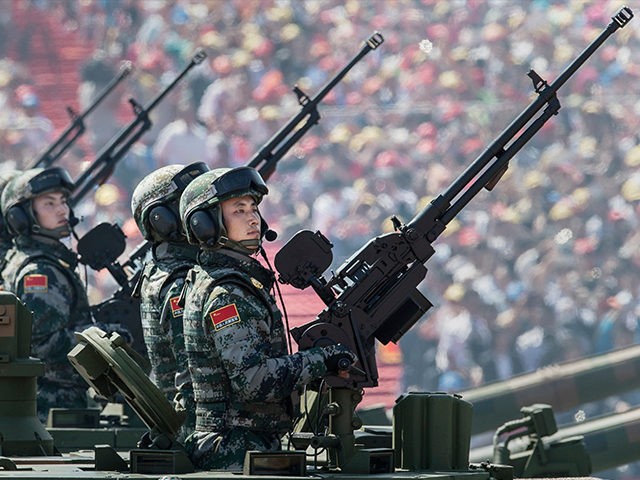China’s growing power throughout the world presents an existential threat to Americans’ future that they are not prepared for, experts warned Thursday during a panel discussion at the 2019 Conservative Political Action Conference (CPAC).
“This is an existential threat. The American people are not prepared to deal with it, but this will be the challenge of our generation, and maybe later ones as well,” said Gordon G. Chang, author and expert on China.
The panel, entitled, “China, the Global Menace,” was one of several during the three-day conference exploring the challenge to the U.S. from a rising China.
Rick Fisher, senior fellow on Asian Military Affairs at the International Assessment and Strategy Center, said China has been methodically building networks around the world, as well as a military that will project power around the globe.
“China for 30 years has been assiduously gathering economic power in all regions of the planet, using this economic power to gather political networks, and is…today convincing those political networks to begin military cooperation to proto-alliance cooperation with China,” he said.
For example, the Shanghai Cooperation Organization started in 1996 as an economic cooperation body, but “all it produces are military exercises,” Fisher said.
He said in July, China announced the China Africa Defense and Security Forum, which includes every country on the African continent but is “controlled by the People’s Liberation Army.”
“So this is the beginning of a second proto-alliance, and they make no bones publicly [that they are] working to form a similar forum in all the countries of Latin America and the Caribbean,” he said.
Experts on the panel said China is the largest source of support outside the region for the Cuban communist regime, the Venezuelan dictatorship, and other left-wing regimes.
Retired Navy Captain Jim Fanell, a former intelligence officer and current fellow at the Geneva Center for Security, said more and more Chinese navy vessels have been going to the Caribbean.
“I expect at some point in the near future, you’re going to start seeing Chinese intelligence collection vessels operating in the Caribbean and more closely to each of our coasts, because they’ve been very frustrated that we’ve been operating inside the first island chain in the Western Pacific,” he said.
Fisher said on top of these “proto-alliances,” China is working on a power-projection military, with a navy that will have anywhere from 10 to 15 aircraft carriers by 2050, hundreds of large transport aircraft, and medium and lightweight army forces that can be deployed around the world.
“And this is the challenge that your children and your grandchildren are facing, and the reason why some of the things President Trump has done … are so very important, and why they must be continued,” he said.
Frank Gaffney, founder and president of the Center for Security Policy, said he has also seen increasingly aggressive rhetoric from senior Chinese military officers.
“Increasingly there have been now remarks by senior Chinese Peoples Liberation Army officers calling for military action against the United States,” he said.
Gaffney said he would not put a “high probability” on making it through the next decade without a war on China. “It’s a function not of us starting it, but of us preventing the Chinese thinking they can benefit from doing so.”
But experts on the panel also said Chinese predominance is not a foregone conclusion, if the U.S. acts.
Fanell argued that the U.S. needs to grow its naval presence in East Asia in order to keep international shipping lanes open, and praised the Trump administration for increasing naval operations in the region.
“We have seen in the last two years under this administration a great increase in not just these freedom of navigation operations that you hear about frequently, but also in carrier operations…between the United States and the Japanese Maritime Self Defense Force, or the Royal Navy.
“And so we’re starting to remind China that we have been in these waters and we’re there not to control them, but we’re there to make sure that people have free access to markets and freedom to buy, sell, and trade, and that’s the assurance and the deterrent credibility we have with presence,” he said.
Fisher argued that the U.S. should take full advantage of the end of the Intermediate-Range Nuclear Forces (INF) agreement to start building up an arsenal of medium- and intermediate-range ballistic and cruise missiles in the region, build the space force, and make clear the U.S. will share new technologies with allies who are also threatened by China.
Chang also questioned the efficacy of China’s Belt and Road Initiative, which aims to build infrastructure linking China to the West through developing countries that would also allegedly benefit.
“The Chinese can say they want to connect to the world, and bring it all back to China, but a lot of that infrastructure is infrastructure that the private sector wouldn’t build,” said Chang.
“You’re starting to see in Beijing right now people starting to say, ‘Oh, no, we just don’t have the money to do this.’ And especially when the Arctic ice cap recedes you’re going to see more shipping across the northern coast of Russia, that’s going to make China’s railroads through Central Asia completely uneconomic,” he said.
Fanell also called for the American public to be more aware of the threat from China.
“This is an idealogical struggle between a nation that says it believes, ‘I live, you die,’ and we haven’t educated the American public on that concept,” he said.
“We’re facing an existential threat and the American people need to know, from shore to shore, that their lifestyles will change if China is able to achieve their goal of the great rejuvenation and the restoration of China.”

COMMENTS
Please let us know if you're having issues with commenting.